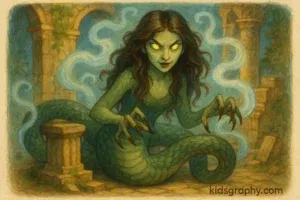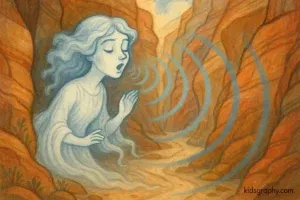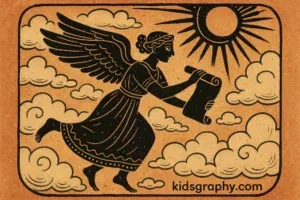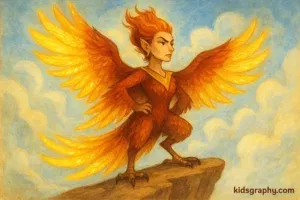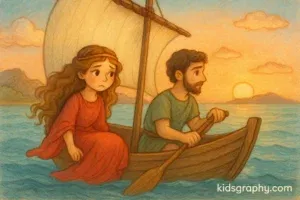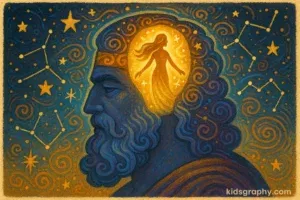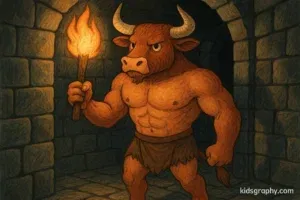In the heart of ancient Greece, where gods ruled the skies and epic tales filled the theaters, there were nine powerful sisters called the Muses. Each Muse inspired a different form of art and wisdom. Among them was Thalia, the bright and cheerful Muse of comedy.
She wasn’t a warrior or queen, but her gift was just as mighty—she made the world laugh.
Read More: Nyx in Greek Mythology: Goddess of the Night
Who Is Thalia in Greek Mythology?
Thalia (also spelled Thaleia) was one of the Nine Muses, the daughters of Zeus, king of the gods, and Mnemosyne, the goddess of memory. These Muses were seen as divine spirits of inspiration, guiding poets, artists, musicians, and scholars.
Thalia’s domain was comedy and pastoral poetry. Her name means “the flourishing one” or “joyous bloom,” and she was believed to bring laughter and good spirits wherever she went. With a radiant smile and an uplifting voice, she encouraged people to find humor in life, even during hard times.
Read More: Calypso Greek Mythology: The Lonely Nymph
Thalia: Muse of Comedy and Pastoral Joy
Thalia wasn’t just about telling jokes—she represented the healing power of laughter and the joy found in everyday life and nature. While her sisters inspired tragic plays or serious science, Thalia inspired lighthearted comedies and poems about the simple beauty of nature.
She often appeared in ancient Greek theaters, symbolized by:
- The comic mask, a wide-eyed, smiling face used in plays
- Ivy crowns and shepherd’s staffs, representing her pastoral side
- Trumpets, used to open theatrical performances
In this way, she helped shape the art of comedy that still exists today.
Read More: Ajax in Greek Mythology: Warrior of Honor and Tragedy
Thalia and the Greek Theater
In ancient Greece, drama was not just entertainment—it was a sacred art form. Huge open-air theaters filled with people who laughed, cried, and learned through plays. Thalia was honored in these spaces as the divine force behind comedy.
She gave inspiration to:
- Playwrights like Aristophanes, who wrote funny, bold stories
- Poets who composed pastoral verses about farm life, animals, and nature
- Actors, who wore masks and made crowds roar with laughter
Even though her role was joyful, it was also important. Comedy gave people a break from war, politics, and suffering. Thalia’s spirit was a gift of relief.
Read More: Circe in Greek Mythology: The Witch of Aiaia
Thalia in Art and Literature
Thalia is often seen in ancient art with a bright smile and theatrical props. Statues and vase paintings show her:
- Holding a comic mask
- Wearing a crown of ivy
- Standing next to her sister Muses, often in a joyful pose
In literature, she’s mentioned as a symbol of festivity and creative joy. Later poets and playwrights called upon her when writing humorous or lighthearted works. She was often invoked in the prologues of comedies, as artists asked her for inspiration.
Read More: Cronus in Greek Mythology: Titan of Time and Power
The Meaning of Thalia’s Myth
Thalia’s story is more than just myth—it’s a message. She teaches us that:
- Laughter is sacred, and joy is a form of wisdom
- Creativity can lift the human spirit
- Even in serious times, a good laugh can bring healing
In a world full of drama and pain, Thalia reminds us to find light—to smile, to laugh, and to create with joy.
Read More: Prometheus in Greek Mythology: The Fire Bringer
Thalia and the Power of the Muses
She wasn’t alone in her divine mission. She was one of the Nine Muses, each with her own specialty. While her sisters inspired tragedy, history, music, and astronomy, Thalia brought joy, wit, and playfulness to the stage.
The Muses worked together to form the foundation of learning and art in the ancient world. People prayed to them at the start of poems or performances, asking for inspiration. Thalia’s role was especially important in theaters and festivals, where comedy helped balance the sorrow of tragedy.
Read More: Typhon in Greek Mythology: The Father of Monsters
Thalia and Apollo
Like all the Muses, Thalia shared a special bond with Apollo, the god of music, poetry, and prophecy. In many myths, Apollo served as the leader or guardian of the Muses, guiding them in their creative roles.
Together, Apollo and Thalia represented:
- Harmony between joy and beauty
- The connection between music and comedy
- The divine spark of laughter and performance
Their bond made Thalia a key figure in the sacred arts of ancient Greece.
Read More: Athena in Greek Mythology: Goddess of Wisdom & War
Thalia in Modern Interpretations
Even today, Thalia’s image and influence appear in:
- The globally recognized pairing of the smiling comedy mask and the somber tragedy mask represents Thalia and Melpomene (the Muse of tragedy) standing together.
- Museums and theaters: Many cultural institutions use her name—like the Thalia Theater in Germany or schools of performing arts.
- Popular media: Modern writers and creators continue to honor her by exploring themes of comedy, lightness, and resilience.
Thalia’s laughter echoes across centuries—a reminder that art doesn’t always have to be serious to be powerful.
More Stories: Thalia in Greek Mythology
FAQ: Thalia in Greek Mythology
Thalia is one of the Nine Muses in Greek mythology. She is the Muse of comedy and pastoral poetry, inspiring laughter and light-hearted art.
Thalia is the Muse of comedy and pastoral poetry. She represents joy, laughter, and the uplifting power of humorous storytelling.
Artists often depict Thalia with a comic theater mask, an ivy wreath, and a shepherd’s staff. These represent her connection to theater and nature.
While not a goddess in the traditional sense, Thalia is a divine figure as one of the Muses, daughters of Zeus and Mnemosyne, with spiritual influence over the arts.
Thalia’s legacy endures through the ubiquitous comedy mask in modern theater and her symbolic presence in expressions of joy and artistic inspiration.
Read More: Hephaestus: The Amazing Greek God of Fire and Forging!





